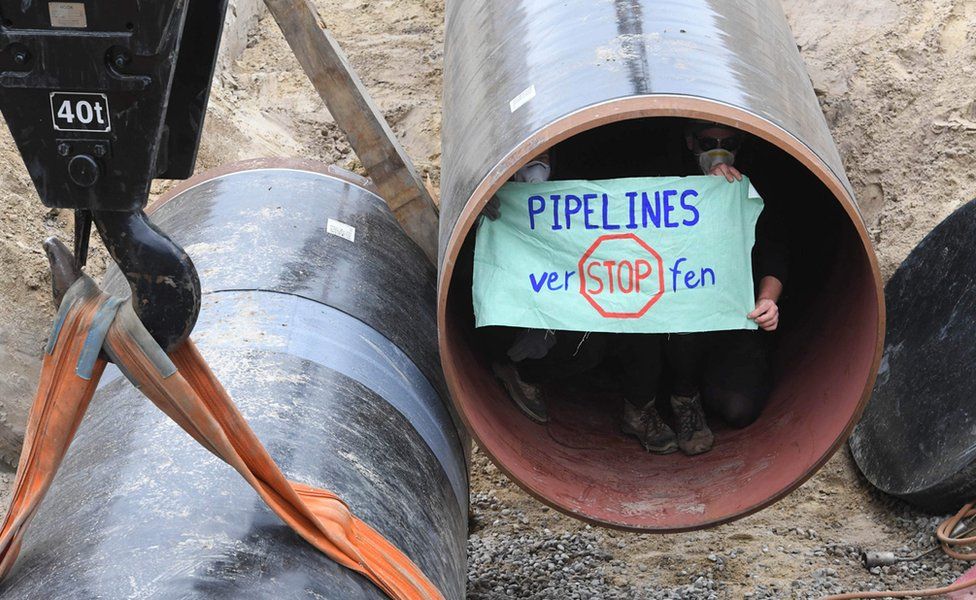Nord Stream 2: Climate activists get into gas pipeline in Germany
- Published

Climate activists have occupied a gas pipeline connecting Russia and Germany, and are skateboarding inside.
The demonstrators, who oppose the use of fossil fuels, say the Nord Stream 2 will be more detrimental to the environment than the authorities claim.
Police say at least five people are occupying the pipes near Wrangelsburg in northern Germany.
The network will double the amount of gas that can be transported directly to Germany from Russia.
The 1,225km (760-mile) controversial pipeline is due to be completed this year.
One protester, Fynn, told the BBC they have been there since 05:30 local time (03:30 GMT), in order to "draw attention to the environmental impact of gas".
"In Germany, gas is advertised as a bridge technology but it is as destructive as [coal]," he said. "That is why we can't have new gas infrastructure, but should stop using fossil fuels instead."
For them, he added, it is not about geopolitics. They are "against any kind of fossil fuel", because "the environmental threat is way bigger than national interests".
"We identify ourselves as part of the global struggle against fossil fuels and the social and environmental injustice connected to them," he says. "Our economic system is based on exploitation, therefore we need to fight the status quo and find new ways."
Allow Twitter content?
This article contains content provided by Twitter. We ask for your permission before anything is loaded, as they may be using cookies and other technologies. You may want to read Twitter’s cookie policy, external and privacy policy, external before accepting. To view this content choose ‘accept and continue’.
Fynn says they are skating inside the pipeline because "we like the idea that pipelines should be used as halfpipes, as it is more fun than fossil fuel and better for our environment.
"We are skating in the pipeline and it is fun!"
In a statement, police in Mecklenburg-Vorpommern said the "safety and health of activists [was] a top priority" and that they were given an oxigen metre.
Work on the construction site has been temporarily suspended as a result of the protest, they add.
What is the problem with Nord Stream 2?
Climate activists are not the only ones who take issue with the new pipeline. For years other EU member states have been concerned about the bloc's reliance on Russian gas.
Russia currently supplies about 40% of the EU's gas supplies - just ahead of Norway, which is not in the EU but takes part in its single market. The new pipeline will increase the amount of gas going under the Baltic to 55 billion cubic metres per year.
Disagreements among EU nations were so strong that, earlier this year, they even threatened to derail the project entirely.
The bloc eventually agreed to strengthen regulations against Nord Stream 2, rather than stop it completely, and to bring it under European control.
Leaders in the US are concerned too. Earlier this week, a group of senators introduced legislation seeking sanctions against the pipeline, and US President Donald Trump has even accused Germany of being a "captive" of Russia because of it.
Why is Germany in favour of the pipeline?
German businesses have invested heavily in Nord Stream 2 and former Chancellor Gerhard Schröder is running the project.
As well as Germany's Uniper and BASF's Wintershall unit, other European companies have stakes too, including Anglo-Dutch Shell, OMV of Austria and Engie of France.
Chancellor Angela Merkel tried to assure Central and Eastern European states in February that the pipeline would not make Germany reliant on Russia for energy.
"Germany will expand its network of gas terminals in regards to liquified gas. Meaning, for gas we do not want to be at all dependent on Russia alone," she said.
- Published8 February 2019
- Published28 April 2019